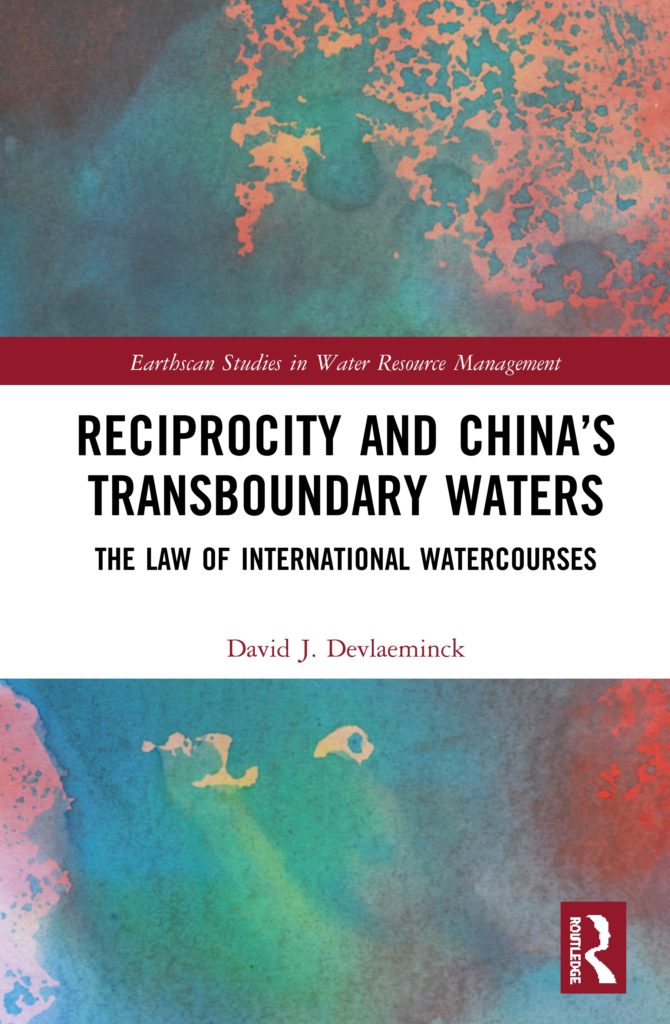
Dr. David J Devlaeminck is Associate Professor at the School of Law, Chongqing University in Chongqing, China. His principal area of interest is international environmental law, with a focus on the law of international watercourses. He has published widely on the subject, including his monograph, Reciprocity and China’s Transboundary Waters: The Law of International Watercourses (Routledge 2021), as well as in international journals such as Review of European, Comparative and International Environmental Law (RECIEL), International Environmental Agreements: Politics, Law and Economics, and the International Journal of Water Resources Development, among others. He is also an Associate Research Fellow at the United Nations University Institute on Comparative Regional Integration Studies located in Bruges, Belgium (2024-2026), Co-Chair of the American Society of International Law (ASIL) Asia-Pacific Interest Group (2024-27), a Founding Affiliate of the International Water Law Academy, Wuhan University (China), a member of the American Society of International Law and the International Water Resources Association. He is also editorial board member for RECIEL and for the Springer book series Water Security in a New World. Apart from his research, David also conducts teaching in international environmental law at the undergraduate and graduate levels and is coach of the Chongqing University Jessup International Law Moot Court team. David completed his BA in Philosophy at the University of Guelph (Canada), a Master of Arts in Philosophy at McMaster University (Canada), a Graduate Certificate in the interdisciplinary Water Without Borders Graduate Programme at the United Nations University – Institute for Water, Environment and Health (Canada), and his PhD in international law at Xiamen University (China).
Please feel free to reach out to me at djdevlaeminck@live.com. I am open to research collaboration, speaking engagements, guest lectures, teaching as well as consultancies.
Reciprocity and China’s Transboundary Waters: The Law of International Watercourses

Utilising the principle of reciprocity, Reciprocity and China’s Transboundary Waters: The Law of International Watercourses analyses the law of international watercourses in the past, present and future with a particular focus on China.
As a legal principle, reciprocity plays a strong role in the formation, interpretation and maintenance of international law. Implementing this framework, the book examines the development of the law of international watercourses, highlighting how this basic legal principle is a foundational notion. It applies the framework to China and offers insights into one of the most important transboundary states in Asia. As a primarily upstream state, China is of great significance to its transboundary neighbours, however, there remain significant hurdles, misunderstandings and mistrust between China and its neighbours. China is faced with a complex challenge – how to meet its own development needs while also taking into consideration its primarily downstream neighbours? By focusing on this prominent state this work not only fosters a greater understanding of the law of international watercourses within China, but also clarifies and challenges current perceptions of China’s transboundary water treaty practice. More generally, the book provides a past, present and future view on international watercourse law, starting with an analysis of the UN Watercourses Convention and UNECE Water Convention leading to a discussion of reciprocity’s continued influence as well as charting a path forward.
This book will be of great interest to legal students and scholars with an interest in international watercourses, environmental politics and international law, as well as students and scholars interested in Chinese politics and natural resource management and conflict.
More information available here: https://www.routledge.com/Reciprocity-and-Chinas-Transboundary-Waters-The-Law-of-International/Devlaeminck/p/book/9780367249793